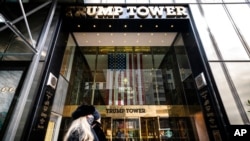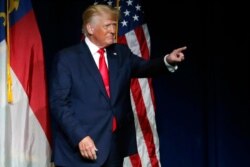Prosecutors in New York on Thursday issued an indictment charging the Trump Organization, the company owned by former U.S. President Donald Trump, with operating a 15-year-long "scheme to defraud" the government, alleging that the organization compensated senior executives with off-the-books benefits such as cash, private school tuition and luxury cars without reporting it to federal or state tax authorities as income.
At the same time, prosecutors indicted the company's chief financial officer, Allen Weisselberg, 73, on 15 charges, including grand larceny and tax fraud. Both Weisselberg and the Trump Organization have pleaded not guilty and vowed to fight the charges in court.
"This was a sweeping and audacious illegal payments scheme," Carey Dunne, general counsel for the Manhattan district attorney, said while presenting the case to the New York State Supreme Court in Manhattan.
Attorneys representing the Trump Organization said the prosecution was purely political, issuing a statement that said, in part, "In our view, this case was brought because the company's name is Trump. ... This case signals that it is now open season for local prosecutors to target federal political opponents and adversaries."
Danger for Trump's company
The indictment of a company on criminal charges isn't a step the government takes lightly, given the severity of the consequences a business could suffer, former prosecutors say.
There are a "host of factors" that go into the decision to charge a company, said attorney Danya Perry, a former New York deputy attorney general and federal prosecutor. "A significant one, and one that has been invoked by Trump's lawyers, is the risk of collateral consequences."
In some cases, even an indictment is enough to drive a company into bankruptcy as customers, clients and creditors weigh whether they want to risk being associated with an organization accused of criminal activity.
The classic case study is the accounting firm Arthur Andersen, once one of the "Big Five" firms managing the books for corporations around the world. The company was charged with multiple crimes related to its work auditing the books of energy giant Enron, which went bankrupt in 2001. Although the U.S. Supreme Court ultimately overturned Arthur Andersen's conviction, the company never recovered from the damage to its reputation and eventually ceased operations.
'Serious ramifications'
Even though the resolution of the case is likely years in the future, just the possibility that the Trump Organization might be found guilty could make other businesses leery of working with the company and make it difficult for the company to obtain financing from banks and other lenders.
A business under indictment can face "serious ramifications" regarding its ability to continue as a going concern, said Miriam Baer, a professor at Brooklyn Law School and a former assistant U.S. attorney in the criminal division of the U.S. Attorney's Office for the Southern District of New York.
"Especially in regulated industries, there may be a particular regulation that basically forces a company to say, 'I can't do business with you,' " she said. "Wholly apart from that, there are other companies that are simply going to say, 'I don't know where you're going to be a year from now, and I'm not taking that risk.' "
More charges possible
The 25-page indictment filed with the court on Thursday makes it plain that Weisselberg was not the only employee of the Trump Organization to receive payments that prosecutors believe were illegal. He was, however, the only individual actually charged with wrongdoing.
It is widely assumed among legal experts that the decision to charge Weisselberg is part of an effort to persuade him to provide evidence that would implicate the former president in illegal conduct — a practice the government commonly uses in various types of prosecutions.
"There's been a lot of speculation and public reporting that the reason why Weisselberg is being charged first is because prosecutors are hoping to flip him," said Perry, the former New York deputy attorney general. "If that does happen, and he does provide cooperation, I think we can certainly expect to see more folks charged. But we're definitely not there yet."
Trump reacts
The former president, his company, and the attorneys representing the accused all slammed the prosecution as politically motivated. The lead prosecutor in the case, Manhattan District Attorney Cyrus Vance Jr., is a Democrat, as is New York state Attorney General Letitia James, whose office helped with the prosecution. Both were in the courtroom on Thursday.
In a statement released Thursday afternoon, Trump said, "The political Witch Hunt by the Radical Left Democrats, with New York now taking over the assignment, continues. It is dividing our Country like never before!"






